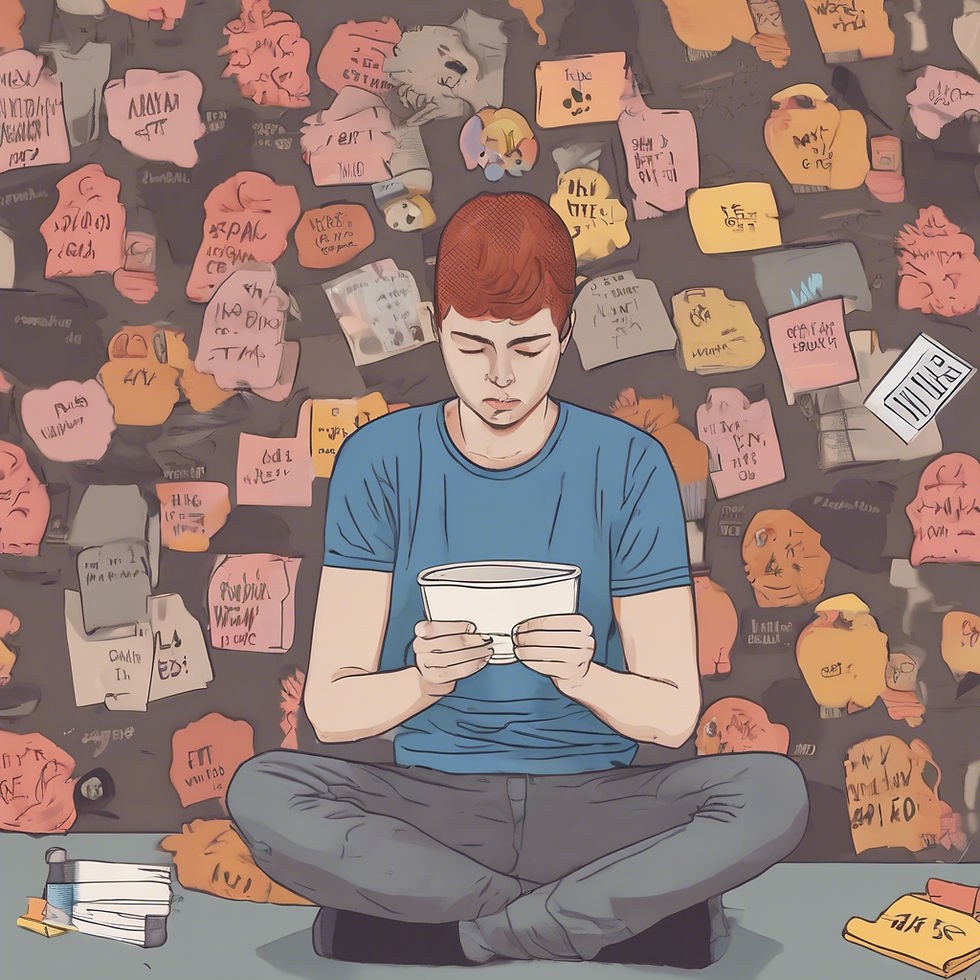How to Talk to Your Inner Critic Like a Boss
- Khushi Malviya
- Jun 30, 2025
- 5 min read
Updated: Jul 1, 2025
Imagine being at a pool party with friends. Think of the critic as a beach ball that showed up at the party. The beach ball wants to float and be tossed around. But if we see that beach ball as a threat for some reason and we focus on how we need to get rid of it by holding it under water so no one can see it, the ball will push back until it’s on the surface. So here we are using all of our energy to fight against the beach ball’s intention of being played with by pushing and holding it underwater because we don’t want it at this party. We end up being less present at the pool party and unable to really enjoy our friends because we’re preoccupied with getting rid of the beach ball.

Now, to talk to our inner critic, we would first have to understand the seven critics, what they do, and how to respond to them, as given by Jay Earley and Bonnie Weiss.
The Seven Inner Critics
The Perfectionist- The perfectionist has unrealistically high standards in everything. All it does is try to save you from getting judged and criticized by making sure that everything is perfect, but it does so by judging and criticizing you. According to its flaws and mistakes are unacceptable, which is why it tells you to do the same thing again and again till it's perfect, which makes tasks very difficult to finish.
It does so by saying things like, “Try harder”, “You can’t leave it like this.”, “See, doesn’t matter how small it is, what if someone sees it, fix it now!”
You can respond to it by thanking it for paying attention to your work, and making it understand that the progress is more important than the perfection, and the mistakes are a part of the growth.
The Taskmaster- The Taskmaster values hard work more than anything. It pushes to work hard all the time and be productive with the fear that if you stop, you'll fall behind. It can get the work done, but at the cost of your physical and mental health, as it can lead to burnout and exhaustion.
It does so by saying things like, “you're slacking, get back to work now.”, “You're on a break? For what? Breaks won't give you the success you wish.”
To respond to it, you can acknowledge it for wanting you to succeed, and let it know that taking breaks can increase productivity and prevent burnout. Saying something like, “We’ll work hard, but within the limits.”
The Inner Controller- It worries about being in control of your impulses, making sure that the diets or routines are in check, but to do that, it becomes overly strict, harsh, and shaming to protect you from yourself, also making you feel unnecessary guilt for resting or eating. It does so to make sure nothing goes out of control.
It says stuff like, “You have no will power.”, “You can't eat that, you'll regret it later.”
You can respond to it by telling it that moderation is the key, also thanking it for keeping you on track. Reminding it that life requires balance and strict control isn’t always necessary.
The Underminer- To keep you safe from failure, it stops you from trying in the first place, by lowering your self-confidence and stopping you from stepping out of your comfort zone. It is very harsh, but it does all this solely because it is afraid of getting hurt, failing, or getting rejected.
It says stuff like, “Why are you even applying, you won't get it anyway.”, “You'll only embarrass yourself.”
You can respond to it by reassuring it that growth is very important, even though new things might be intimidating, also reminding it that you're capable and you don’t need to be perfect to try new things. Success requires showing up more than total confidence.
The Guilt Tripper- The Guilt Tripper enjoys lingering on previous events, recalling times when you might have caused pain to others or erred. This critic argues that clinging to guilt will prevent you from making those mistakes again.
It does so by saying things like, “How could you do that? They’ll never forgive you.”, “You always mess things up, you never learn.”
To respond to it, you can show compassion by acknowledging the lessons learned and also letting go of the burden of guilt. Forgive yourself, you don’t need to carry the guilt forever. Thank the guilt tripper for caring and move forward.
The Destroyer- The Destroyer is the most intimate and profoundly painful of all the critics, as it challenges your values at a fundamental level. It’s the sound of profound shame, frequently based on previous injuries.
It says stuff like, “you are not good enough, never were, and never will be.”, “You're worthless.”
You can respond to it by reminding it that you are worthy enough, just as you are, acknowledging that the mistakes and flaws don’t define your worth.
The Conformist- The Conformist desires for you to blend in, to adhere to societal norms, and to evade criticism. It focuses on connections and maintains the behavioral standards set by your community, culture, and family. It fears being different and facing criticism, which causes you to suppress your uniqueness.
It does so by saying stuff like, “Just blend in, you're too much.”, “What will people think?”
To respond to it, Express gratitude to the Conformist for their desire to shield you from criticism, but emphasize that staying true to yourself matters. Remember that your individuality is your power and that genuine relationships develop when you are authentic.
Seek Help- It’s a bit of a challenge to work with your inner critic alone. Therapy helps in transforming and exploring them, creating a safe space for yourself.



